Effective Disruption Management Strategies: Jamalon Case Study
VerifiedAdded on 2023/06/05
|5
|1118
|383
Report
AI Summary
This report examines Jamalon, the largest online bookstore in the Middle East, and its strategies for managing disruptions within its supply chain and business model. It identifies potential threats, including market fragmentation, natural disasters, and man-made disruptions like compliance issues and infrastructural challenges. The report highlights Jamalon's efforts to address these issues, such as establishing a robust distribution channel and introducing on-demand printing services to support self-publishing authors, thus fostering growth in the Arabic book market. Ultimately, Jamalon aims to bridge the gap between books and readers in the region by effectively managing disruptions and fostering a more accessible and dynamic publishing industry. Desklib provides a platform to explore similar solved assignments and past papers for students.
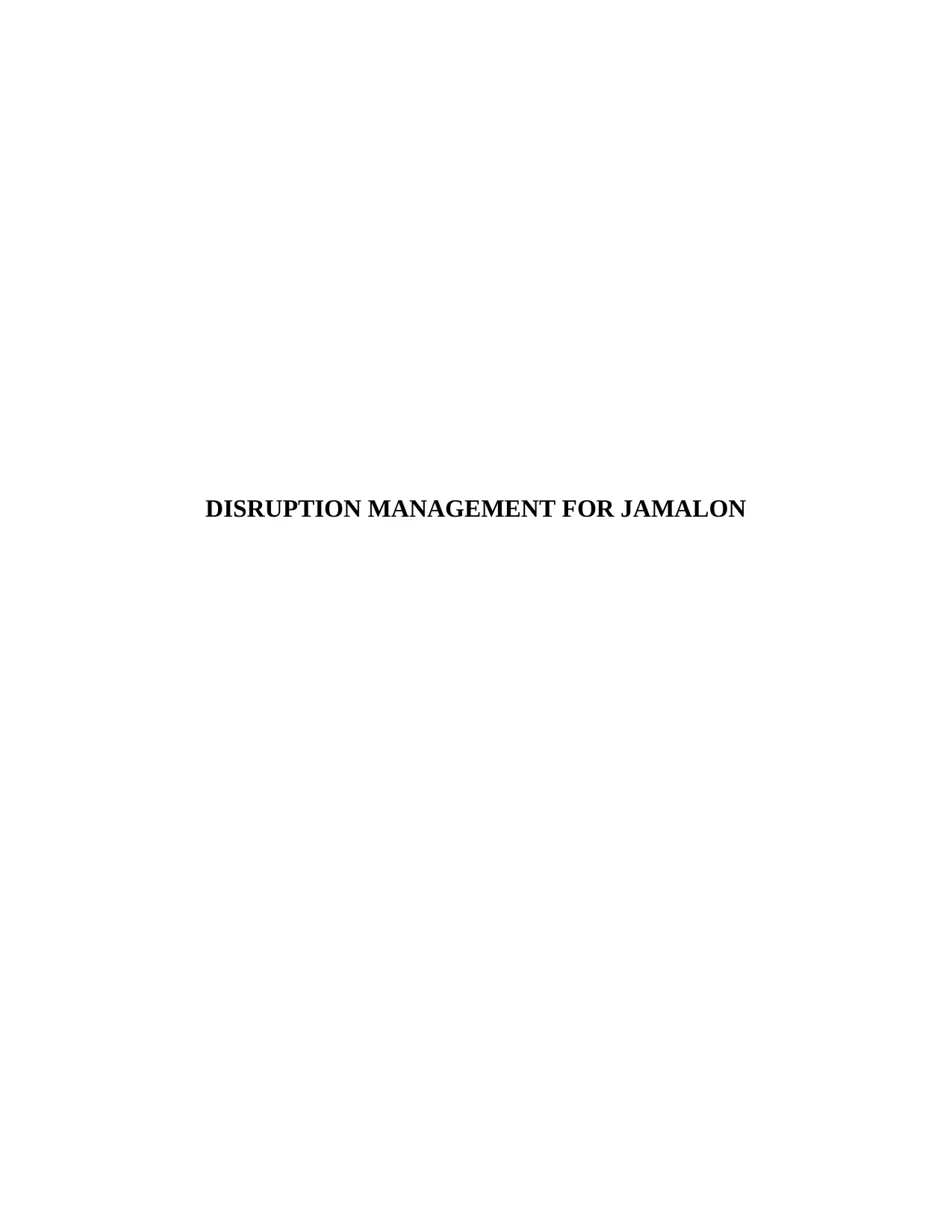
DISRUPTION MANAGEMENT FOR JAMALON
Paraphrase This Document
Need a fresh take? Get an instant paraphrase of this document with our AI Paraphraser
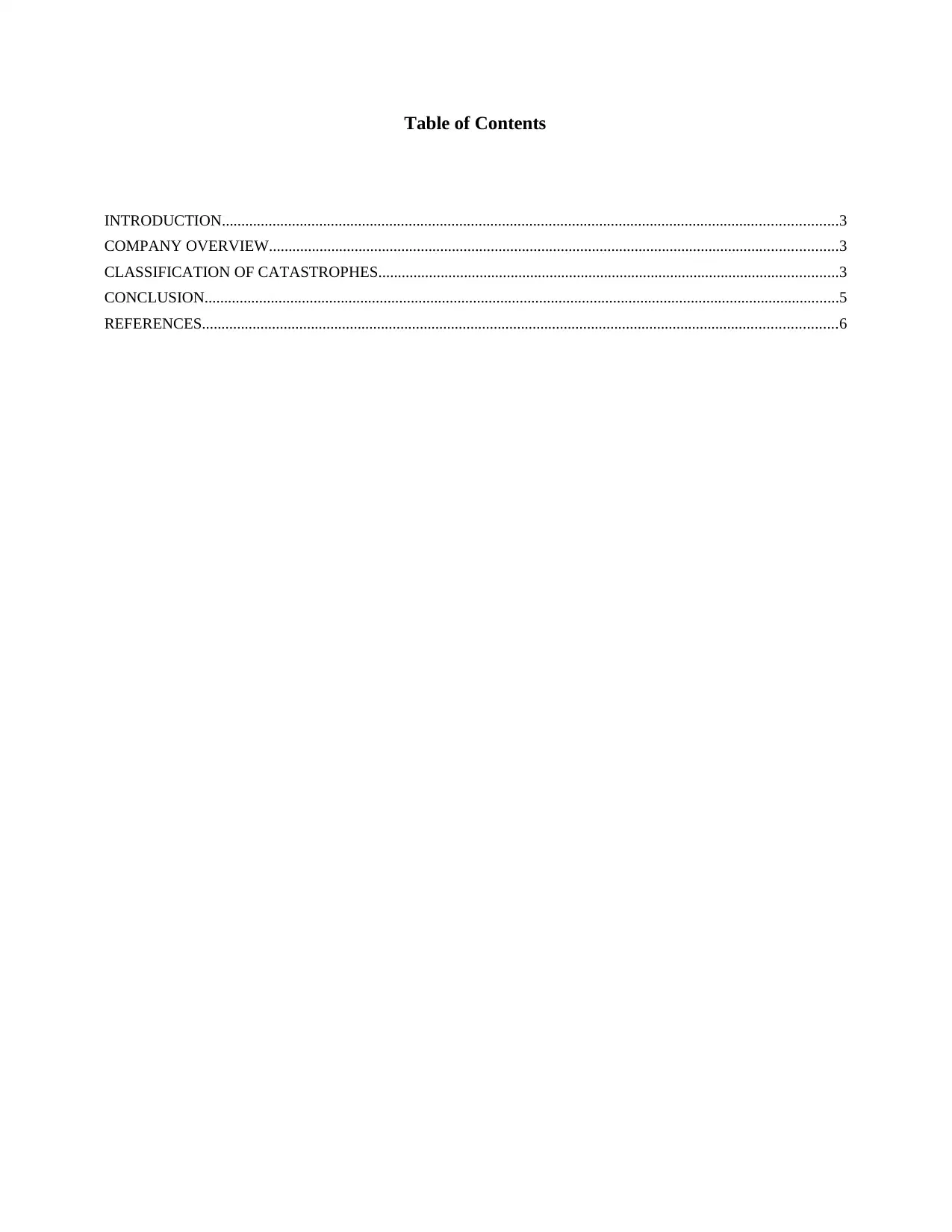
Table of Contents
INTRODUCTION..............................................................................................................................................................3
COMPANY OVERVIEW..................................................................................................................................................3
CLASSIFICATION OF CATASTROPHES......................................................................................................................3
CONCLUSION...................................................................................................................................................................5
REFERENCES...................................................................................................................................................................6
INTRODUCTION..............................................................................................................................................................3
COMPANY OVERVIEW..................................................................................................................................................3
CLASSIFICATION OF CATASTROPHES......................................................................................................................3
CONCLUSION...................................................................................................................................................................5
REFERENCES...................................................................................................................................................................6
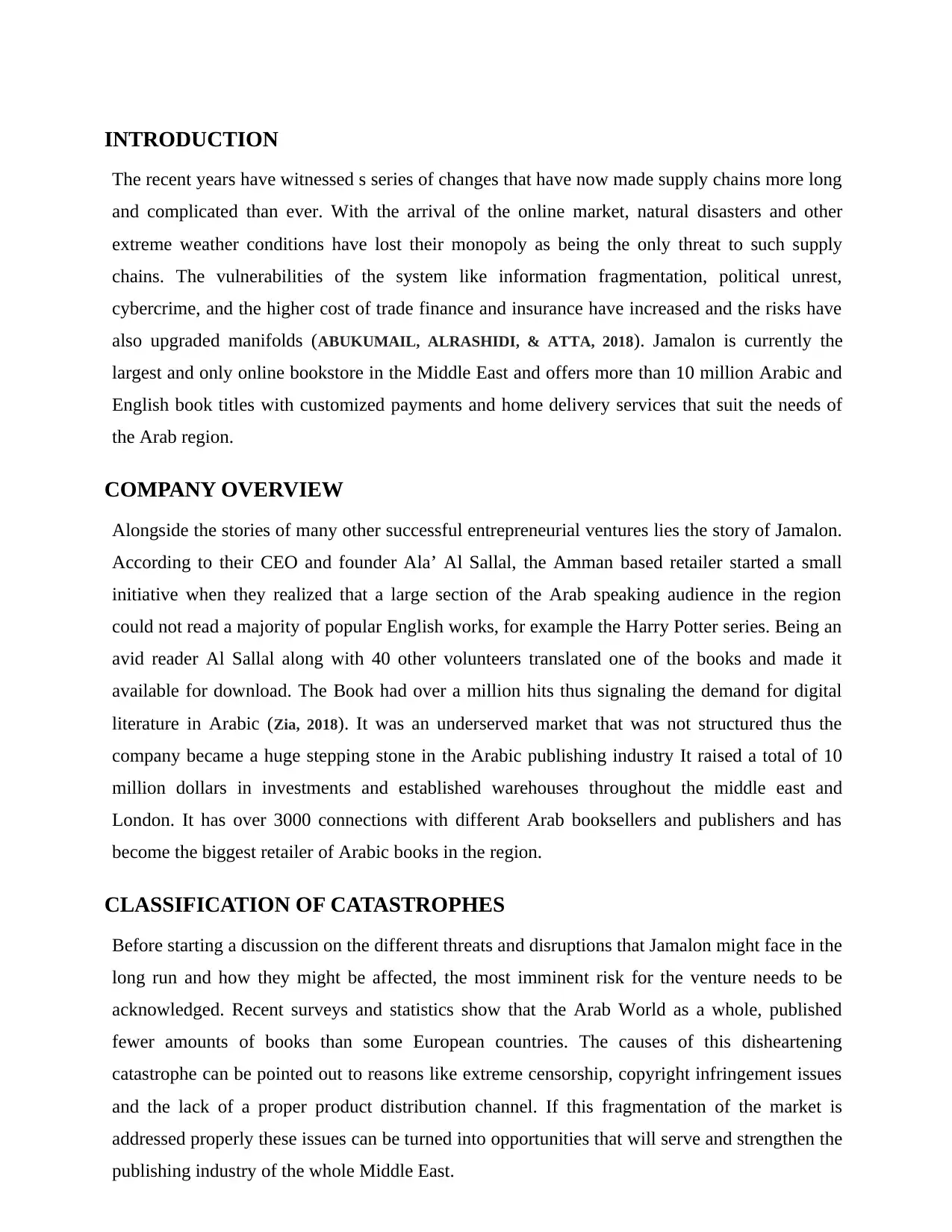
INTRODUCTION
The recent years have witnessed s series of changes that have now made supply chains more long
and complicated than ever. With the arrival of the online market, natural disasters and other
extreme weather conditions have lost their monopoly as being the only threat to such supply
chains. The vulnerabilities of the system like information fragmentation, political unrest,
cybercrime, and the higher cost of trade finance and insurance have increased and the risks have
also upgraded manifolds (ABUKUMAIL, ALRASHIDI, & ATTA, 2018). Jamalon is currently the
largest and only online bookstore in the Middle East and offers more than 10 million Arabic and
English book titles with customized payments and home delivery services that suit the needs of
the Arab region.
COMPANY OVERVIEW
Alongside the stories of many other successful entrepreneurial ventures lies the story of Jamalon.
According to their CEO and founder Ala’ Al Sallal, the Amman based retailer started a small
initiative when they realized that a large section of the Arab speaking audience in the region
could not read a majority of popular English works, for example the Harry Potter series. Being an
avid reader Al Sallal along with 40 other volunteers translated one of the books and made it
available for download. The Book had over a million hits thus signaling the demand for digital
literature in Arabic (Zia, 2018). It was an underserved market that was not structured thus the
company became a huge stepping stone in the Arabic publishing industry It raised a total of 10
million dollars in investments and established warehouses throughout the middle east and
London. It has over 3000 connections with different Arab booksellers and publishers and has
become the biggest retailer of Arabic books in the region.
CLASSIFICATION OF CATASTROPHES
Before starting a discussion on the different threats and disruptions that Jamalon might face in the
long run and how they might be affected, the most imminent risk for the venture needs to be
acknowledged. Recent surveys and statistics show that the Arab World as a whole, published
fewer amounts of books than some European countries. The causes of this disheartening
catastrophe can be pointed out to reasons like extreme censorship, copyright infringement issues
and the lack of a proper product distribution channel. If this fragmentation of the market is
addressed properly these issues can be turned into opportunities that will serve and strengthen the
publishing industry of the whole Middle East.
The recent years have witnessed s series of changes that have now made supply chains more long
and complicated than ever. With the arrival of the online market, natural disasters and other
extreme weather conditions have lost their monopoly as being the only threat to such supply
chains. The vulnerabilities of the system like information fragmentation, political unrest,
cybercrime, and the higher cost of trade finance and insurance have increased and the risks have
also upgraded manifolds (ABUKUMAIL, ALRASHIDI, & ATTA, 2018). Jamalon is currently the
largest and only online bookstore in the Middle East and offers more than 10 million Arabic and
English book titles with customized payments and home delivery services that suit the needs of
the Arab region.
COMPANY OVERVIEW
Alongside the stories of many other successful entrepreneurial ventures lies the story of Jamalon.
According to their CEO and founder Ala’ Al Sallal, the Amman based retailer started a small
initiative when they realized that a large section of the Arab speaking audience in the region
could not read a majority of popular English works, for example the Harry Potter series. Being an
avid reader Al Sallal along with 40 other volunteers translated one of the books and made it
available for download. The Book had over a million hits thus signaling the demand for digital
literature in Arabic (Zia, 2018). It was an underserved market that was not structured thus the
company became a huge stepping stone in the Arabic publishing industry It raised a total of 10
million dollars in investments and established warehouses throughout the middle east and
London. It has over 3000 connections with different Arab booksellers and publishers and has
become the biggest retailer of Arabic books in the region.
CLASSIFICATION OF CATASTROPHES
Before starting a discussion on the different threats and disruptions that Jamalon might face in the
long run and how they might be affected, the most imminent risk for the venture needs to be
acknowledged. Recent surveys and statistics show that the Arab World as a whole, published
fewer amounts of books than some European countries. The causes of this disheartening
catastrophe can be pointed out to reasons like extreme censorship, copyright infringement issues
and the lack of a proper product distribution channel. If this fragmentation of the market is
addressed properly these issues can be turned into opportunities that will serve and strengthen the
publishing industry of the whole Middle East.
⊘ This is a preview!⊘
Do you want full access?
Subscribe today to unlock all pages.

Trusted by 1+ million students worldwide
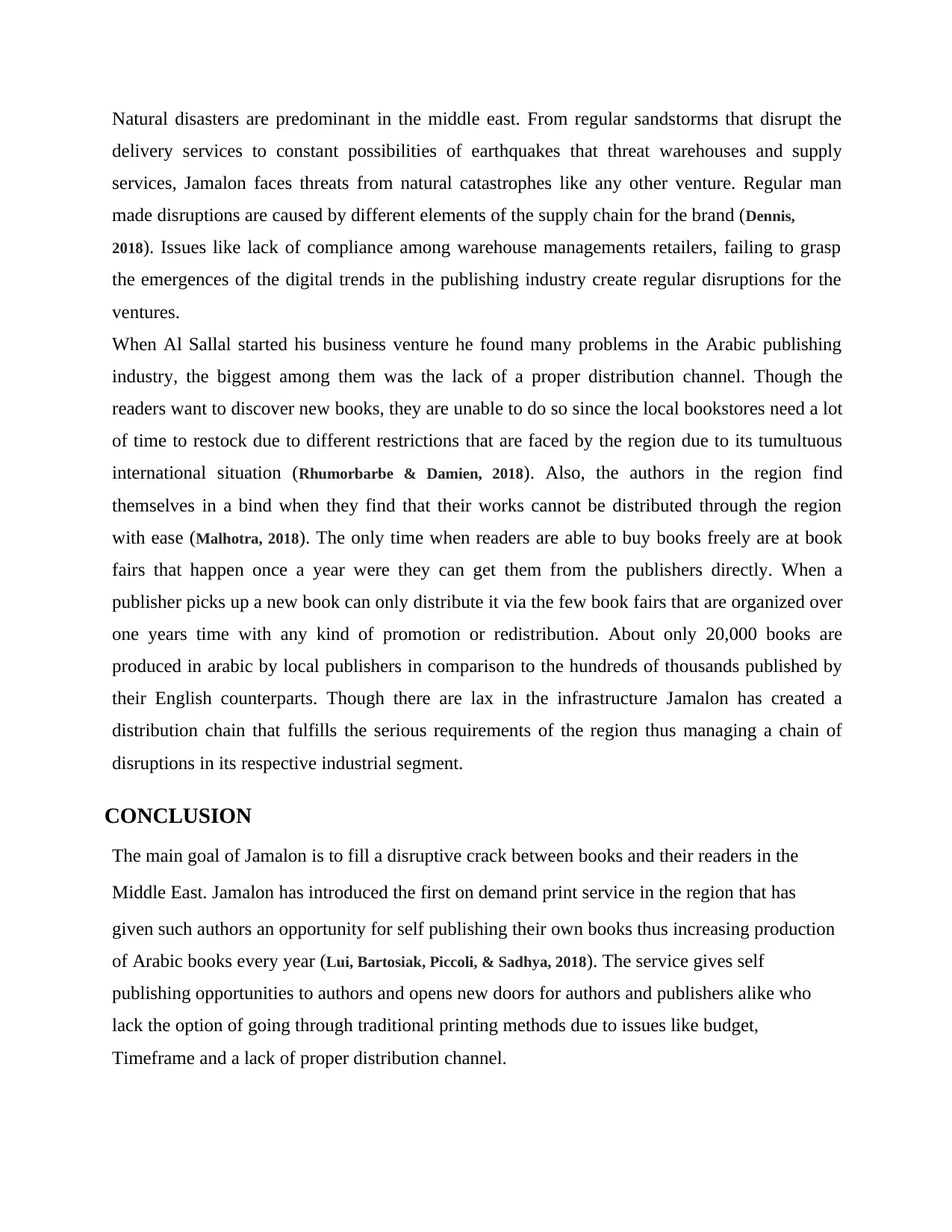
Natural disasters are predominant in the middle east. From regular sandstorms that disrupt the
delivery services to constant possibilities of earthquakes that threat warehouses and supply
services, Jamalon faces threats from natural catastrophes like any other venture. Regular man
made disruptions are caused by different elements of the supply chain for the brand (Dennis,
2018). Issues like lack of compliance among warehouse managements retailers, failing to grasp
the emergences of the digital trends in the publishing industry create regular disruptions for the
ventures.
When Al Sallal started his business venture he found many problems in the Arabic publishing
industry, the biggest among them was the lack of a proper distribution channel. Though the
readers want to discover new books, they are unable to do so since the local bookstores need a lot
of time to restock due to different restrictions that are faced by the region due to its tumultuous
international situation (Rhumorbarbe & Damien, 2018). Also, the authors in the region find
themselves in a bind when they find that their works cannot be distributed through the region
with ease (Malhotra, 2018). The only time when readers are able to buy books freely are at book
fairs that happen once a year were they can get them from the publishers directly. When a
publisher picks up a new book can only distribute it via the few book fairs that are organized over
one years time with any kind of promotion or redistribution. About only 20,000 books are
produced in arabic by local publishers in comparison to the hundreds of thousands published by
their English counterparts. Though there are lax in the infrastructure Jamalon has created a
distribution chain that fulfills the serious requirements of the region thus managing a chain of
disruptions in its respective industrial segment.
CONCLUSION
The main goal of Jamalon is to fill a disruptive crack between books and their readers in the
Middle East. Jamalon has introduced the first on demand print service in the region that has
given such authors an opportunity for self publishing their own books thus increasing production
of Arabic books every year (Lui, Bartosiak, Piccoli, & Sadhya, 2018). The service gives self
publishing opportunities to authors and opens new doors for authors and publishers alike who
lack the option of going through traditional printing methods due to issues like budget,
Timeframe and a lack of proper distribution channel.
delivery services to constant possibilities of earthquakes that threat warehouses and supply
services, Jamalon faces threats from natural catastrophes like any other venture. Regular man
made disruptions are caused by different elements of the supply chain for the brand (Dennis,
2018). Issues like lack of compliance among warehouse managements retailers, failing to grasp
the emergences of the digital trends in the publishing industry create regular disruptions for the
ventures.
When Al Sallal started his business venture he found many problems in the Arabic publishing
industry, the biggest among them was the lack of a proper distribution channel. Though the
readers want to discover new books, they are unable to do so since the local bookstores need a lot
of time to restock due to different restrictions that are faced by the region due to its tumultuous
international situation (Rhumorbarbe & Damien, 2018). Also, the authors in the region find
themselves in a bind when they find that their works cannot be distributed through the region
with ease (Malhotra, 2018). The only time when readers are able to buy books freely are at book
fairs that happen once a year were they can get them from the publishers directly. When a
publisher picks up a new book can only distribute it via the few book fairs that are organized over
one years time with any kind of promotion or redistribution. About only 20,000 books are
produced in arabic by local publishers in comparison to the hundreds of thousands published by
their English counterparts. Though there are lax in the infrastructure Jamalon has created a
distribution chain that fulfills the serious requirements of the region thus managing a chain of
disruptions in its respective industrial segment.
CONCLUSION
The main goal of Jamalon is to fill a disruptive crack between books and their readers in the
Middle East. Jamalon has introduced the first on demand print service in the region that has
given such authors an opportunity for self publishing their own books thus increasing production
of Arabic books every year (Lui, Bartosiak, Piccoli, & Sadhya, 2018). The service gives self
publishing opportunities to authors and opens new doors for authors and publishers alike who
lack the option of going through traditional printing methods due to issues like budget,
Timeframe and a lack of proper distribution channel.
Paraphrase This Document
Need a fresh take? Get an instant paraphrase of this document with our AI Paraphraser
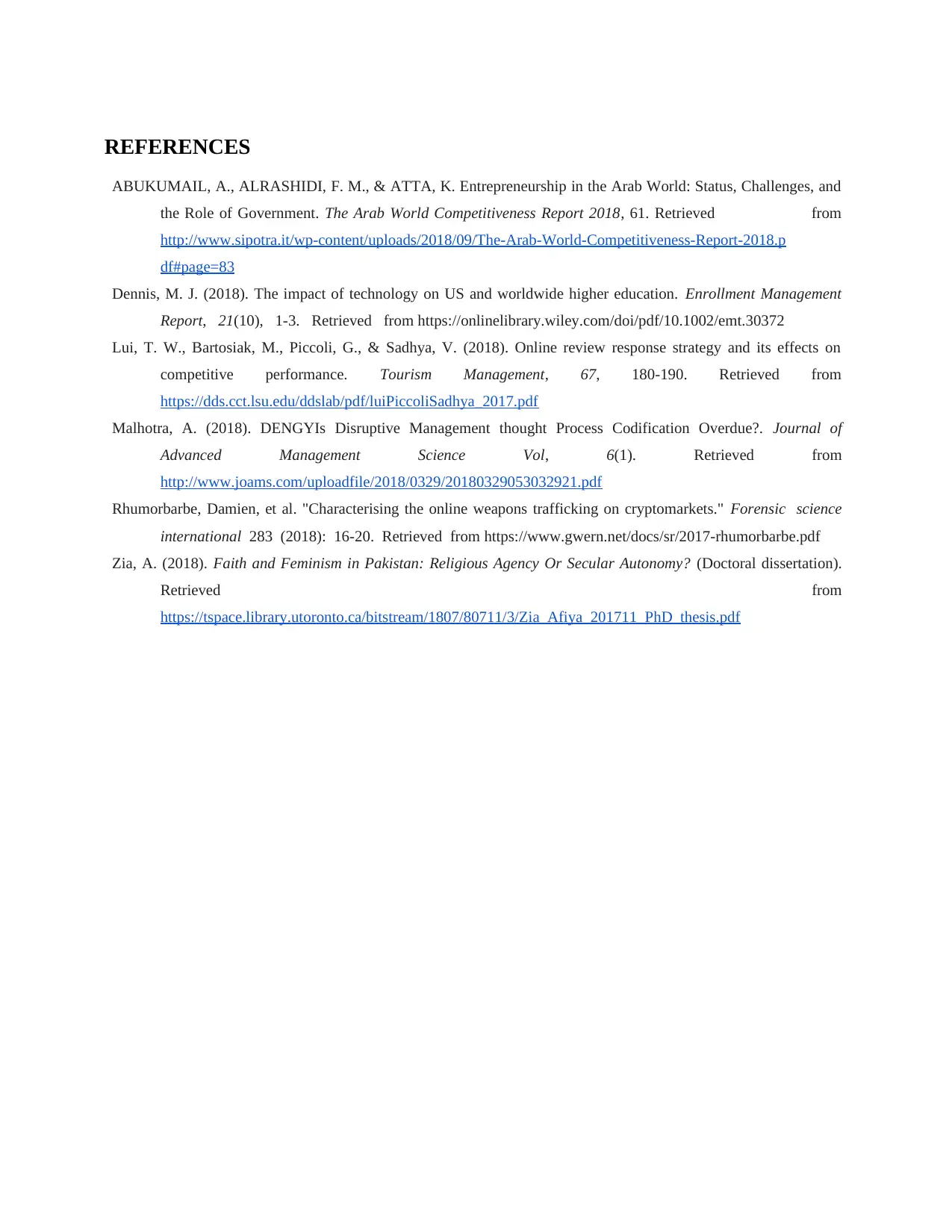
REFERENCES
ABUKUMAIL, A., ALRASHIDI, F. M., & ATTA, K. Entrepreneurship in the Arab World: Status, Challenges, and
the Role of Government. The Arab World Competitiveness Report 2018, 61. Retrieved from
http://www.sipotra.it/wp-content/uploads/2018/09/The-Arab-World-Competitiveness-Report-2018.p
df#page=83
Dennis, M. J. (2018). The impact of technology on US and worldwide higher education. Enrollment Management
Report, 21(10), 1-3. Retrieved from https://onlinelibrary.wiley.com/doi/pdf/10.1002/emt.30372
Lui, T. W., Bartosiak, M., Piccoli, G., & Sadhya, V. (2018). Online review response strategy and its effects on
competitive performance. Tourism Management, 67, 180-190. Retrieved from
https://dds.cct.lsu.edu/ddslab/pdf/luiPiccoliSadhya_2017.pdf
Malhotra, A. (2018). DENGYIs Disruptive Management thought Process Codification Overdue?. Journal of
Advanced Management Science Vol, 6(1). Retrieved from
http://www.joams.com/uploadfile/2018/0329/20180329053032921.pdf
Rhumorbarbe, Damien, et al. "Characterising the online weapons trafficking on cryptomarkets." Forensic science
international 283 (2018): 16-20. Retrieved from https://www.gwern.net/docs/sr/2017-rhumorbarbe.pdf
Zia, A. (2018). Faith and Feminism in Pakistan: Religious Agency Or Secular Autonomy? (Doctoral dissertation).
Retrieved from
https://tspace.library.utoronto.ca/bitstream/1807/80711/3/Zia_Afiya_201711_PhD_thesis.pdf
ABUKUMAIL, A., ALRASHIDI, F. M., & ATTA, K. Entrepreneurship in the Arab World: Status, Challenges, and
the Role of Government. The Arab World Competitiveness Report 2018, 61. Retrieved from
http://www.sipotra.it/wp-content/uploads/2018/09/The-Arab-World-Competitiveness-Report-2018.p
df#page=83
Dennis, M. J. (2018). The impact of technology on US and worldwide higher education. Enrollment Management
Report, 21(10), 1-3. Retrieved from https://onlinelibrary.wiley.com/doi/pdf/10.1002/emt.30372
Lui, T. W., Bartosiak, M., Piccoli, G., & Sadhya, V. (2018). Online review response strategy and its effects on
competitive performance. Tourism Management, 67, 180-190. Retrieved from
https://dds.cct.lsu.edu/ddslab/pdf/luiPiccoliSadhya_2017.pdf
Malhotra, A. (2018). DENGYIs Disruptive Management thought Process Codification Overdue?. Journal of
Advanced Management Science Vol, 6(1). Retrieved from
http://www.joams.com/uploadfile/2018/0329/20180329053032921.pdf
Rhumorbarbe, Damien, et al. "Characterising the online weapons trafficking on cryptomarkets." Forensic science
international 283 (2018): 16-20. Retrieved from https://www.gwern.net/docs/sr/2017-rhumorbarbe.pdf
Zia, A. (2018). Faith and Feminism in Pakistan: Religious Agency Or Secular Autonomy? (Doctoral dissertation).
Retrieved from
https://tspace.library.utoronto.ca/bitstream/1807/80711/3/Zia_Afiya_201711_PhD_thesis.pdf
1 out of 5
Your All-in-One AI-Powered Toolkit for Academic Success.
+13062052269
info@desklib.com
Available 24*7 on WhatsApp / Email
![[object Object]](/_next/static/media/star-bottom.7253800d.svg)
Unlock your academic potential
Copyright © 2020–2026 A2Z Services. All Rights Reserved. Developed and managed by ZUCOL.